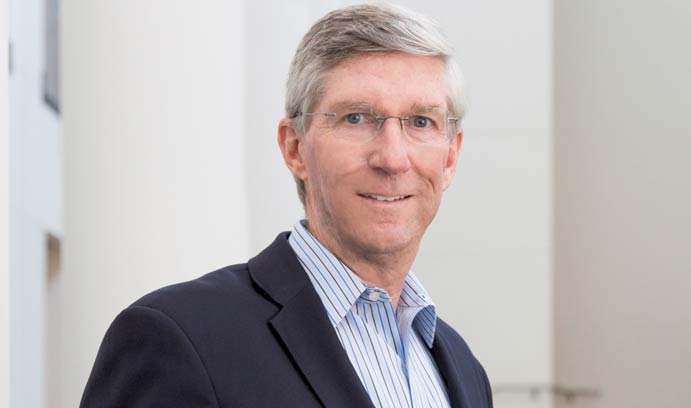Vince Forlenza ’75: Seeking 'A New Model' for Global Health Care

Vince Forlenza ’75 says change is imminent for health care, both domestically and worldwide.
To hear Vince Forlenza tell it, we are living in the best of times—and the most challenging of times—when it comes to health care.
Forlenza ’75 has for the past six years served as president and CEO of Becton Dickinson, a Franklin Lakes, N.J.-based health care firm that works to develop and advance new technologies and approaches to public health. In all, he has spent more than 35 years with the company and, over the course of that tenure, has served in a variety of leadership roles, exposing him to all sides of the company’s multifaceted health care-focused business.
Quite simply, he knows his sector, and global health care, as well as anybody. Which means he knows more than enough to know this: The time for change in health care has come.
“Globally, most people would probably say that health care as currently structured is unsustainable, both here and around the world,” says Forlenza. “In terms of economic outcomes, clinical outcomes and safety, none of the health care systems out there are where they need to be. Everyone is struggling with the question, ‘What is the new model?’”
Forlenza doesn’t claim to have that answer. But he does believe his company is doing its part to find it—and he believes Lehigh will eventually play a role in that search as well.
Driving innovation
Under Forlenza’s leadership, BD has blossomed into a true global health care powerhouse. With nearly 50,000 employees working in 50 different countries, the company has specialties in diabetes care, infection prevention, medication management, biosciences and diagnostics, among others, and in April announced a $24 billion merger with C.R. Bard, a New Jersey-based firm that focuses on clinical solutions to some of the most common diseases, such as peripheral vascular disease and cancer. That merger followed a 2015 deal that saw Forlenza’s BD acquire San Diego-based CareFusion for $12.2 billion.
The two acquisitions represented a huge strategic move for BD in a time of great upheaval across the entire sector. As Forlenza explains, his aim as CEO is not just to position the company for bottom-line success, but also to create a firm that can fundamentally change the world of health care for the better.
“As you can imagine, it’s a very exciting time for our company,” he says. “We believe we are being very proactive in responding to the changing realities of health care. The bottom line is that we believe health care systems and health care providers need really strategic partners to drive positive change in health care.”
“You want to be purpose-driven and you want to be focused on impact—to improve the world. Our purpose is to advance the world of health,” he adds. “We have this exciting journey that we’re on in terms of improving fundamental health care processes—medication management and integrated diabetes care, for instance. And I expect that in five years we’ll have made significant progress on all of those things.”
Striving for impact
Forlenza’s efforts to change the world of health care aren’t limited to his work at BD alone, however. He also serves as vice chairman of the board of trustees for The Valley Hospital in Ridgewood, N.J., and he and his wife, Ellen, have two daughters, one of whom has autism. In 2000, the Forlenzas were driving forces behind the founding of the Quest Autism Foundation, a New Jersey-based nonprofit that works to provide support and services to adults with autism.
“Health care is what excites me,” he says. “It’s what I do here at BD and what I do in my personal life.”
Given his passion in the field, then, it’s hardly a surprise that Forlenza, a longtime member of the Lehigh Board of Trustees, has also served as a key supporter of Lehigh’s plans to create and launch a new college of health. That initiative seeks to seize on Lehigh’s existing strengths to build a cutting-edge college focused specifically on solving the health care issues of tomorrow.
“It’s a perfect time for Lehigh to be working toward a college of health,” he says. “There are major issues in health care that need to be solved. We need to figure out the provider model, how you pay for health care, what health care policy looks like, the technologies that will enable those things to happen. And I think Lehigh has a lot to contribute in terms of how we can think about creating healthy communities—this more holistic approach to health. How do you help engineer that and make change happen? I think we have a lot of core capabilities that can be leveraged in interesting ways.
“If you think through all of the expertise at Lehigh in a very coherent way, it makes for a very interesting mix.”
The Future of Health Care
So what, ultimately, will the future of health care look like?
Forlenza isn’t entirely sure. But he does believe that if all the key players in all the right sectors—from the business world, to higher education, to policy makers, to health care systems—do their part, a better, more sustainable health care model is feasible.
Creating that model is certainly a daunting challenge, he says. But it’s not an impossible challenge.
“This is actually a really exciting time in terms of new technologies in health care,” he says. “Certainly that’s true in the area of biotechnology and our understanding of the potential in that area. It’s pretty incredible what’s happening with things like DNA sequencing, gene-editing tools, informatics. All of these things are enabling potential new care pathways, new models for health care, connected care, hospital-to-home treatment. It’s just a very exciting time in health care.”
Posted on:

